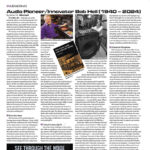From AC/DC to U2, Berlin to Yes, Janet Jackson to Tina Turner, Cher to Madonna, Barney to Walking with Dinosaurs, Bob the Builder to the Wiggles, Metallica to the Rolling Stones — production manager Jake Berry has earned a backstage pass to some of the biggest acts in the business, and to rock ‘n’ roll history itself. What started with a beer with a keyboardist decades ago has evolved into one of the most enviable and fascinating careers in live event production, one worthy of the industry’s highest honor, the Parnelli Lifetime Achievement Award, which will be bestowed on Berry Nov. 20 in Orlando, Fla.
“He combines all those attributes that are so important in a production manager — logistical ability, management, a lightning sharp financial brain, the ability to tread carefully through a political minefield and a view of the big picture,” declares award-winning lighting designer Patrick Woodroffe. “But most of all he has courage.”
“There’s a county in the southwest of England called Devonshire,” says Yes keyboardist Rick Wakeman. “It is famous for being a holiday destination and having pretty thatched cottages, thousands of sheep, an accent few people can understand and Jake Berry! He is a credit to the industry and a credit to all who have had the pleasure of knowing him, including me. He is one very special guy.
“After a few years working with me he moved on to AC/DC — that is, the band, not the lifestyle choice. As the years rolled by, Jake continued to climb the ladder, and no one could be more proud of what he achieved than me.”
Berry’s resourcefulness is legendary. Fellow tour/production manager Ian Jeffrey tells of an AC/DC gig that was scheduled at an outdoor arena in Phoenix, but torrential rains had created a swimming pool in front of the stage. There was talk of canceling the gig. Instead, Berry strapped down all the equipment on stage and hired a helicopter. In logic that exists only in Berry’s mind, the idea was the helicopter would hover close to the ground and the wind it created would push the water away. It worked; the gig went on.
“He was very noisy and certainly mad, which helps in this business,” recalls acclaimed scenic designer Mark Fisher. “He’s somebody who people will follow through conditions of great difficulty as well as in the good times. And he would never ask anyone to do anything that he wouldn’t do himself, even today.”
“Jake has shown the industry how to take mammoth productions on the road without artistic compromise and still make money,” says former Parnelli winner and scenic designer Michael Tait, who also worked with Berry. “He has the ability to edit a production to its essentials, yet maintain that tenuous balance of pleasing artist, management and designer. He attracts dedicated and talented road crews who are fiercely loyal and will follow him anywhere.”
A Beer and a Career
Steven “Jake” Berry was born in the small village of Exeter, Devon, in the U.K., along with his twin brother, Trevor, in 1953. At age 12 the brothers formed a rock group with Jake on drums. “We called ourselves the Scandal because we thought it was scandalous that people would pay money to hear us,” he laughs. His career as a musician was aborted when he sold his Sonor drum set when he was 18.
Trevor turned his attention to thatching roofs and Jake worked as a truck driver, among other vocations. Trevor happened to be thatching the country home of one Rick Wakeman, who resided in the quiet hills of Devon. “One day I finished my work early and my mother asked if I could take some things my brother had forgotten to take with him on a job,” Berry says. Upon delivery, Berry struck up a conversation with the rock star and the two decided to share a pint at a nearby pub. Both men recall it leading to an afternoon of drinking, followed by an evening of drinking, followed by a job.
“Out of the blue, Rick told me he was doing this show at Wembley [Arena in London] and asked if I wanted to come help,” Berry recalls. “Then there I was, pushing cases.”
“I first met Jake in 1974 when I moved to Devon to try to cut back on my drinking. Jake was a tremendous help to me and actually played an enormous part in increasing my alcoholic intake by about 300 percent,” jokes Wakeman. “In 1975 he came to London with me to help with my King Arthur shows. Jake then said he really wanted to learn everything there was about the production side of the music business and asked to stay on as part of the crew. Over the ensuing years, Jake literally spent every waking hour learning his craft. He roadied for every possible instrument and musician there was and even spent time doing things like discussing what kind of sticks drummers used!”
He went to London where Wakeman had rejoined Yes and went on the group’s Going for the One tour. During this period, he met someone who was crucial in the development of his career: Ian Jeffrey (AC/DC, David Bowie, Madonna, Sting, among others).
“Jake got his start with AC/DC because of the telling of a fib,” laughs Jeffrey. After working with Yes, Jeffrey was working with AC/DC as tour manager/FOH mixer. The band was opening for Black Sabbath when they started to explode in popularity. Suddenly they needed a production manager/stage manager, and he immediately thought Berry would be perfect, despite the fact that Berry’s experience in live concert touring was limited at the time.
So in 1979, in a plot that could only be hatched in a pub after an evening of draining pints, it was decided that the band would be told that Berry had stage managed for Yes. Jeffrey’s faith, however, was unwavering and was willing to put his own reputation on the line for Berry. They just had to convince manager Peter Mench.
Highway to Hell
“When I got my start as AC/DC’s manager, I was told to hire Jake Berry as our production manager,” legendary rock manager Mench recalls. “I count that as among the smartest decisions I have ever made. Culminating with a couple of Metallica tours, Jake did an amazing job. Clearly, now he is at the top of his game with U2.”
The promotion was a whirlwind experience for Berry. “The next thing you know I’m landing in Oakland, Calif., as production manager for the 1979 Highway to Hell tour,” Berry says. “We had two trucks, and I knew nothing. I was terrified, but there were a lot of great people on that tour who really helped me out.” The band grew to trust Jake, and his success landed him on AC/DC’s payroll permanently.
He credits Jeffrey as being a superb mentor. “I would listen to how he would advance a show, make notes and then do it myself. And he taught me my first important lesson, which is never appear like you don’t know something. Always say, ‘I’ll get back to you on that,’” Berry laughs.
In February 1980, the band and their fans were shattered by the death of singer Bon Scott from alcohol poisoning. In what he says was his lowest moment of his career, he and Jeffrey had the gruesome task of going back to Scott’s apartment and cleaning it all up.
In 1983, while with the band in San Francisco, he got word his father passed away. “It was terrible, but the one thing that has stayed with me all my life is how wonderful the band was. Malcolm [Young] came in to see how I was and then told Ian, ‘You f@#king make sure he sits in the front of the plane and make sure he gets a car and driver when he lands.’ And they sent the biggest bouquet of flowers, too.”
When AC/DC was taking a break from touring, he went to work, albeit briefly, for Ronnie James Dio.
“Dio was the only person to ever fire me,” he says. Berry says they were doing a show in Quebec, and he was trying to explain to non-English-speaking French Canadians how the complicated introduction with lasers needed to go when he was summoned to Dio’s dressing room. Feeling that the task at hand was more important, he kept working on the show. Dio didn’t see it that way and fired him.
“I flew home thinking I would never work in this business again.”
That fear turned out to be fallacious. Rich Fisher, tour manager of Mötley Crüe, would give him his next opportunity. “During the 1980s I worked with a lot of heavy metal bands,” he says. “We did crazy things — like playing all 50 states with Metallica.” And every band was trying to top the others. “If Iron Maiden had 800 PAR cans we had to have 850.”
The 1990s came, and Berry continued to spend an enormous amount of time on some of the top-selling tours of the day, including Mötley Crüe’s Theatre of Pain, followed by Girls Girls Girls. “It was a very creative time,” he says and recalls when they had Crüe drummer Tommy Lee spinning around with his drums during a performance. “We used a forklift and hydraulics, did it for about $85,000, and safety concerns were zilch! That effect would cost over a million dollars today. We’d just open the curtain, push it out there and then pray it worked!”
Berry also worked with Roger Davis, another legendary manager whom Berry refers to as the “King of the Divas” for his landmark work with Cher, Tina Turner and Janet Jackson. Berry was part of many of those phenomenal tours.
You Can Get What You Want
Once when Berry had a rare open spot in his schedule, he called Jeffrey looking for work. Jeffrey said that they were trying to find a drum tech for Berlin. “I can do that!” Berry said. Despite his lack of experience in that area, Berry came aboard and learned quickly. Typical of Berry, he had a great time doing it. He also has equally fond memories of touring for Frankie Goes to Hollywood during the same period.
In 1993, Canadian concert promoter (and now chairman of Live Nation) Michael Cohl called Berry and told him the Rolling Stones were looking for a new production manager for the Steel Wheels tour. Being a fan since he was a teenager, this was an opportunity to “meet the people you idolized as a kid.”
“Next thing I know, I was standing in a room at the Four Seasons in London looking out the window, and then I just froze — I knew Mick [Jagger] had walked into the room without even seeing him. Suddenly I was a little kid from Devon again.” That meeting went well, as did one with drummer Charlie Watts (“the gentleman of rock ‘n’ roll”). “When I went in to meet Keith, he was playing pool with [tennis star] John McEnroe. He asked who I worked with and when I said AC/DC, he replied, ‘That’s my favorite band. I love Angus. You’re hired.’”
For Berry it was a like jumping to the major leagues. “It was a whole new spectrum of touring.” Working on this tour and then the Voodoo Lounge tour allowed him to work with lighting designer Patrick Woodroffe.
“There is no one more passionate, committed, or able than Jake Berry to lift a huge production up onto his shoulders and then set off on tour for a year,” Woodroffe explains. “Although I have seen him in many frightening situations, both intellectual and physical, he has never appeared afraid. He makes decisive decisions that seem to sweep everyone along in his wake.” He adds with a laugh: “And we do both have the shared experience of having being threatened by Keith Richards. With Jake, it involved a knife, and me, a gun. But we both managed to survive with our dignity and cojones intact!”
Berry adds that it gave him a chance to work with “the greatest set designer of all time,” Mark Fisher. Fisher, who since 1994 has done many live events with Berry, recognized that when Berry joined the Stones he was indeed “the new kid.” “It was important that we got on well with him because he was the new kid on the block,” he says. “And Jake is very good with dealing with stars and made himself at home very quickly.”
Berry quickly analyzed the workings of the organization. Jagger and Watts typically provided the creative direction a tour would take, while Richards concerned himself almost exclusively with the sound. “You couldn’t have an element on the stage that would [hinder] the sound,” he says.” Fisher and Woodroffe would start the process of design and go back and forth with the band until they had something they were all excited about.
Yet Berry got off to a rocky start. Early in preparing for the tour, “I remember the rehearsals for Voodoo Lounge, and a heavy Jumbotron screen fell,” Berry recalls. In notifying the band of the setback, word failed to get to Richards, and a tough confrontation ensued. “They were honest words,” he says. “I had just taken another production manager’s place and Keith wanted to know how he could trust me after that.” Berry took his lumps and went off and proved himself. Today there’s an original artwork by Richards hanging in Berry’s house which came with a note that states simply: “He who came through — Love, Keith.”
In 2002 the Stones again summoned him for the Forty Licks tour, which was memorable for being the tour in which Berry turned 50. The day before his birthday, the band was preparing for a show in Munich. Berry was informed that Jagger wanted to see him in his dressing room. It was a sobering request, as Berry points out that if one is ever summoned to a rock star’s dressing room, it is not to have lavish praised heaped upon oneself.
When Berry got to Jagger, he led him to where a party was in full swing — a party for Berry. He did a double take as he spotted his mom, sitting between Richards and Ronnie Wood. “It was total class,” he said. And speaking of class, tour manager Alan Dunn treated Berry and the gang by dressing in drag.
What would happen next is an embarrassment of riches. A meeting with Paul McGuiness led to an invitation to join another of rock’s royal families, U2. Berry flew to Dublin, sat down with the band, and soon he was working on their tours. Berry would become an important member of that family, too. When health-conscious Bono heard he wasn’t feeling well, he demanded Berry be sent to the Mayo Clinic. Berry asked Bono if he had a choice and was firmly told no. Soon Berry was in Rochester, Minn., getting a long overdue, thorough checkup.
Dinosaurs Big and Small — and Beyond
When he’s not touring with U2 he keeps busy with other projects, including family-oriented tours with Disney, Barney, Bob the Builder and the Wiggles. His biggest family-show act has been the touring mega-hit Walking with Dinosaurs, where he was a key player in figuring out how to transport more than a dozen life-size dinosaurs around the world. Of that show, he quipped: “There were less egos but more luggage.”
Berry’s skill set doesn’t include the technical aspects (“I’m the least technically minded tour manager you’ll ever meet!”), but he attributes his success to a hardy work ethic, an unquenchable thirst for knowledge and the ability to communicate.
And none of it has gone to his head. “People say you don’t have to push cases, but you know why I do it? I enjoy it.” It’s that attitude that has led him into a number of hobbies, including managing race-car drivers.
Berry says he’s honored to receive the Parnelli Lifetime Achievement Award. “When something like this goes to you, it’s humbling,” he says. “At the end of the day, when you work in a field for 35 years and you get something like this, it’s like winning the Super Bowl. I’m thankful to have received it.”
Berry has lived in Phoenix for the past 16 years, and today he shares his home with his girlfriend, Megan. He also keeps as close as he can to his two daughters, Jessica and Britain.
“It has been said that Jake considers the performance an inconvenience between load-in and load-out,” Tait says. “Nothing could be further from the truth. He has a passion for the show. His input often involves advising the artist on structure, pace and content. He does everything possible to enhance the audience experience. However, be warned, if you are ever involved with one of his load-outs you have to be very fast or you will have to get out of the way.”
Lighting designer Willie Williams, who has worked with Berry on U2 tours, says: “He’s unafraid of a challenge, responsibility, Very Big Things, or very large numbers of trucks. He’s unafraid of a tight schedule, management, promoters, agents, or Live Nation. He’s unafraid of rock stars, lighting designers, set designers, video directors, or sound engineers. He’s unafraid of dinosaurs, be they large and life-like or purple and fluffy. Can he build it? Yes he can!”
And when asked to reflect on it all, Berry says: “You look back at your youth, you remember when your mother asked when you’re going to get a real job, your teacher yelling that you’re not going to make anything of your life…and here I am. I’ve been paid to travel the world.”
Berry will receive his Parnelli Lifetime Achievement Award at a ceremony on Nov. 20 in Orlando. For more information on the Parnellis, go to www.parnelliawards.com.



